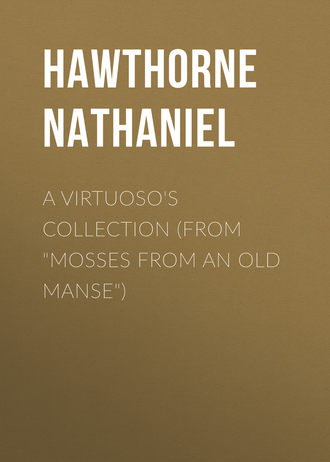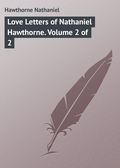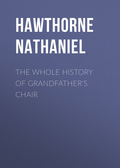
Натаниель Готорн
A Virtuoso's Collection (From "Mosses from an Old Manse")
The virtuoso now opened the door of a closet and showed me a lamp burning, while three others stood unlighted by its side. One of the three was the lamp of Diogenes, another that of Guy Fawkes, and the third that which Hero set forth to the midnight breeze in the high tower of Ahydos.
“See!” said the virtuoso, blowing with all his force at the lighted lamp.
The flame quivered and shrank away from his breath, but clung to the wick, and resumed its brilliancy as soon as the blast was exhausted.
“It is an undying lamp from the tomb of Charlemagne,” observed my guide. “That flame was kindled a thousand years ago.”
“How ridiculous to kindle an unnatural light in tombs!” exclaimed I. “We should seek to behold the dead in the light of heaven. But what is the meaning of this chafing-dish of glowing coals?”
“That,” answered the virtuoso, “is the original fire which Prometheus stole from heaven. Look steadfastly into it, and you will discern another curiosity.”
I gazed into that fire, – which, symbolically, was the origin of all that was bright and glorious in the soul of man, – and in the midst of it, behold a little reptile, sporting with evident enjoyment of the fervid heat! It was a salamander.
“What a sacrilege!” cried I, with inexpressible disgust. “Can you find no better use for this ethereal fire than to cherish a loathsome reptile in it? Yet there are men who abuse the sacred fire of their own souls to as foul and guilty a purpose.”
The virtuoso made no answer except by a dry laugh and an assurance that the salamander was the very same which Benvenuto Cellini had seen in his father’s household fire. He then proceeded to show me other rarities; for this closet appeared to be the receptacle of what he considered most valuable in his collection.
“There,” said he, “is the Great Carbuncle of the White Mountains.”
I gazed with no little interest at this mighty gem, which it had been one of the wild projects of my youth to discover. Possibly it might have looked brighter to me in those days than now; at all events, it had not such brilliancy as to detain me long from the other articles of the museum. The virtuoso pointed out to me a crystalline stone which hung by a gold chain against the wall.
“That is the philosopher’s stone,” said he.
“And have you the elixir vita which generally accompanies it?” inquired I.
“Even so; this urn is filled with it,” he replied. “A draught would refresh you. Here is Hebe’s cup; will you quaff a health from it?”
My heart thrilled within me at the idea of such a reviving draught; for methought I had great need of it after travelling so far on the dusty road of life. But I know not whether it were a peculiar glance in the virtuoso’s eye, or the circumstance that this most precious liquid was contained in an antique sepulchral urn, that made me pause. Then came many a thought with which, in the calmer and better hours of life, I had strengthened myself to feel that Death is the very friend whom, in his due season, even the happiest mortal should be willing to embrace.
“No; I desire not an earthly immortality,” said I.
“Were man to live longer on the earth, the spiritual would die out of him. The spark of ethereal fire would be choked by the material, the sensual. There is a celestial something within us that requires, after a certain time, the atmosphere of heaven to preserve it from decay and ruin. I will have none of this liquid. You do well to keep it in a sepulchral urn; for it would produce death while bestowing the shadow of life.”
“All this is unintelligible to me,” responded my guide, with indifference. “Life – earthly life – is the only good. But you refuse the draught? Well, it is not likely to be offered twice within one man’s experience. Probably you have griefs which you seek to forget in death. I can enable you to forget them in life. Will you take a draught of Lethe?”
As he spoke, the virtuoso took from the shelf a crystal vase containing a sable liquor, which caught no reflected image from the objects around.
“Not for the world!” exclaimed I, shrinking back. “I can spare none of my recollections, not even those of error or sorrow. They are all alike the food of my spirit. As well never to have lived as to lose them now.”
Without further parley we passed to the next alcove, the shelves of which were burdened with ancient volumes and with those rolls of papyrus in which was treasured up the eldest wisdom of the earth. Perhaps the most valuable work in the collection, to a bibliomaniac, was the Book of Hermes. For my part, however, I would have given a higher price for those six of the Sibyl’s books which Tarquin refused to purchase, and which the virtuoso informed me he had himself found in the cave of Trophonius. Doubtless these old volumes contain prophecies of the fate of Rome, both as respects the decline and fall of her temporal empire and the rise of her spiritual one. Not without value, likewise, was the work of Anaxagoras on Nature, hitherto supposed to be irrecoverably lost, and the missing treatises of Longinus, by which modern criticism might profit, and those books of Livy for which the classic student has so long sorrowed without hope. Among these precious tomes I observed the original manuscript of the Koran, and also that of the Mormon Bible in Joe Smith’s authentic autograph. Alexander’s copy of the Iliad was also there, enclosed in the jewelled casket of Darius, still fragrant of the perfumes which the Persian kept in it.
Opening an iron-clasped volume, bound in black leather, I discovered it to be Cornelius Agrippa’s book of magic; and it was rendered still more interesting by the fact that many flowers, ancient and modern, were pressed between its leaves. Here was a rose from Eve’s bridal bower, and all those red and white roses which were plucked in the garden of the Temple by the partisans of York and Lancaster. Here was Halleck’s Wild Rose of Alloway. Cowper had contributed a Sensitive Plant, and Wordsworth an Eglantine, and Burns a Mountain Daisy, and Kirke White a Star of Bethlehem, and Longfellow a Sprig of Fennel, with its yellow flowers. James Russell Lowell had given a Pressed Flower, but fragrant still, which had been shadowed in the Rhine. There was also a sprig from Southey’s Holly Tree. One of the most beautiful specimens was a Fringed Gentian, which had been plucked and preserved for immortality by Bryant. From Jones Very, a poet whose voice is scarcely heard among us by reason of its depth, there was a Wind Flower and a Columbine.
As I closed Cornelius Agrippa’s magic volume, an old, mildewed letter fell upon the floor. It proved to be an autograph from the Flying Dutchman to his wife. I could linger no longer among books; for the afternoon was waning, and there was yet much to see. The bare mention of a few more curiosities must suffice. The immense skull of Polyphemus was recognizable by the cavernous hollow in the centre of the forehead where once had blazed the giant’s single eye. The tub of Diogenes, Medea’s caldron, and Psyche’s vase of beauty were placed one within another. Pandora’s box, without the lid, stood next, containing nothing but the girdle of Venus, which had been carelessly flung into it. A bundle of birch-rods which had been used by Shenstone’s schoolmistress were tied up with the Countess of Salisbury’s garter. I know not which to value most, a roc’s egg as big as an ordinary hogshead, or the shell of the egg which Columbus set upon its end. Perhaps the most delicate article in the whole museum was Queen Mab’s chariot, which, to guard it from the touch of meddlesome fingers, was placed under a glass tumbler.







